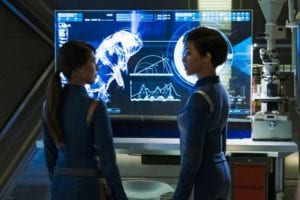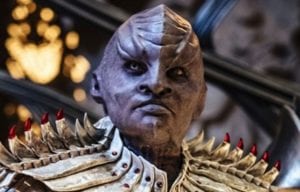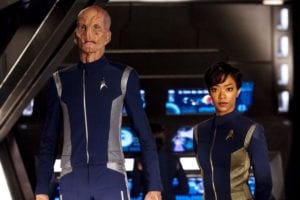Let’s just jump right in to Star Trek: Discovery’s messy, convoluted episode.
Episode 4: The Butcher’s Knife Cares Not for the Lamb’s Cries
After Burnham receives her Starfleet science uniform (“Rank: None” in case we had forgotten she was still a convict), Tilly brings her a package. It is the last will and testament of Captain Philippa Georgiou, but she is unable to open it and stuffs it beneath her bunk.
Summoned to the bridge, Burnham observes Captain Lorca running a battle simulation against the Klingons. After it fails, leading to the “death” of the entire crew and their thorough chastising, Lorca takes Burnham to his personal laboratory—the place where he studies war. He shows Burnham the alien creature from last episode, safely locked up in a containment pen. Burnham is obviously concerned about having it on the ship, but reluctantly accepts Lorca’s task for her: study the creature, learn its offensive and defensive mechanisms, and weaponize it for the Discovery.
Elsewhere, T’Kuvma’s ship remains stranded in the wreckage of the battle of the binary stars. Seemingly abandoned by the other Klingons, Voq reaches out to T’Kuvma’s spirit to ask for guidance for the Klingons and their ship repairs. L’Rell suggests they salvage the dilithium processor from the scuttled Shenzhou. When Voq expresses fury at the idea of using parts from the ship that brought down T’Kuvma, she reminds him it’s not that much different from cannibalizing the Starfleet vessel’s captain—which he had enjoyed. She convinces him to find a bridge between T’Kuvma’s desire for purity and their need for survival.
Because of Burnham’s misgivings, Lorca sends Security Commander Landry (Rekha Sharma) to be her partner; between Burnham’s science and Landry’s “tactics,” they should be able to understand and weaponize the “monster, Ripper” in record time. Burnham, having studied the creature some already, questions whether the alien is actually a monster. It shares traits with the microscopic tardigrade: a docile creature of Earth that can withstand enormous heat, cold and pressure. Burnham wonders how the alien got onto the Glenn. Landry insists they find something to use from Ripper for Lorca’s ends. Burnham is frustrated by Landry’s insistence on judging it by its appearance and the single incident they met it in, when it might have been defending itself. Landry reminds her Lorca doesn’t care about what it is—or who she is—but what it can do for him.
In his ready room, Lorca receives a message from Admiral Cornwell. She delivers a distress signal from Corvan 2, a mining facility under attack by Klingons. As the supplier of forty percent of Starfleet’s dilithium, it is imperative that the facility be saved. The nearest vessel without the Discovery’s potential warp capabilities is eighty-four hours away. Lorca tells her the Discovery is ready and able to make the long jump and save the facility.
Stamets disagrees. Discovery has issues with jumping, losing navigational stability every time. While he has the technology from the Glenn, Stamets is still trying to understand and incorporate it into Discovery’s systems. Lorca insists they make the jump.
On the Klingon vessel, Kol beams aboard. Voq welcomes him, and Kol expresses his regret for their previous encounter and his previous cruelty toward him. Voq forgives him and bids him rise, saying that T’Kuvma teaches that only the enemy will kneel before the united Klingon Empire. Kol implores Voq to return to the war, as his ship is the only one with the most advanced cloaking technology. Voq promises him his nearly-repaired ship—what belongs to House T’Kuvma belongs to all in the united Empire.
The Discovery attempts the long jump to Corvan 2 with Stamets adjustments to the spore drive and navigational system. It fails. They drop out of organic warp into the gravity well of an O-type star. They barely avoid collision, and Stamets is severely injured in the resulting turbulence.
In Lorca’s lab, Burnham observes Ripper. When Landry arrives, Burnham informs her that prior to the actual jump, Ripper cried out in distress. She connects it with the spore drive. Landry isn’t interested, since it has nothing to do with its aggression. Their job is to learn about its aggression, how it fights and kills. Not how it feels.

As Dr. Hugh Culber (Wilson Cruz) patches up Stamets in sickbay, Lorca visits and reminds them of their mission. At a snub against his ability to get the technology to fully function, Stamets reminds Lorca that he did not sign up to be a soldier. He is a scientist, he signed up to be a scientist on a science vessel, and science cannot be rushed. Lorca asks him how he wants to be remembered: as a scientist, or a failed one? A hero, or a selfish little man?
Landry pushes forward. After failing to sedate Ripper—in order to harvest its claws and study them—she shoots at the creature. Ripper overpowers her. Burnham manages to get it back into the containment pen, but not before it mauls Landry to death.
Near T’Kuvma’s ship, Voq finally salvages the dilithium processor from the Shenzhou after exploring the ruins of the captain’s ready room. L’Rell joins him, locating the processor and assisting in its removal. She tells him she has no problem with following Voq, having never wanted leadership herself but rather the freedom to move behind the scenes as defender, enforcer, and campaigner. The two of them return to their ship with the processor.
Burnham tries something new with Ripper. After tricking Saru into coming to the laboratory to gauge his natural threat response to it, Burnham learns she was right Ripper not being a predator. She proceeds to the next part of her experiment. With Tilly’s help, she exposes Ripper to the spores, and it approaches her calmly and seems to engage with them. Burnham takes her discovery to Stamets: Ripper entered the Glenn looking for the mushrooms and spores its hold. Burnham suspects Ripper can somehow control the spores and the organic network the Starfleet ships are trying to travel on. Stamets and Burnham decide to beam Ripper into the Discovery’s fertile forest, and are fascinated by how Ripper communes with the spores.
On T’Kuvma’s ship, Kol has recruited all of Voq’s followers with food and the promise of survival. Kol returns to his former self, insulting Voq, insisting he is nothing, and blaming him for T’Kuvma’s death. L’Rell appears to betray Voq, handing the dilithium processor to Kol. When she is ordered to kill Voq, however, she suggests another fate, and Voq is left on the Shenzhou to die.
With Ripper attached to the technology from the Glenn, Discovery attempts the jump again. Ripper lets them make the jump, the coordinates it naturally houses in its brain keeping the Discovery stable, but Burnham realizes it is in acute pain and distress. At Corvan 2, Discovery rescues the mining facility by distracting the Klingons and then destroying them while warping away from the planetoid.
On the ruined Shenzhou, Voq reaffirms his faith in T’Kuvmaand a united Empire. L’Rell comes to him. He accuses her of treason, but L’Rell assures him she did it to save him. She reveals her plan to take him to House Mokai where he will be tested and trained by the Matriarchs. Then he will be prepared to win the war and be seen by all the Empire as the true torchbearer. Voq agrees to this plan.
At last, Burnham opens the last will and testament of her late captain. Philippa Georgiou leaves her a hologram message and a family heirloom: a telescope. She reminds Burnham that the best way to know others is to know oneself, to keep investigating inside and out, and to keep eyes and heart open.
Episode Impressions
I’m going to have to start keeping a list of the killed, aren’t I?
Commander Landry’s death was unnecessary. On top of being the second woman of color and another Asian actress to be killed in two episodes, her character had so much wasted potential. As someone in a position of power who clearly bought into Lorca’s “ends justify means” ideology, if Landry surviving and learning from the mauling would have changed the dynamics of the ship, undermining the martial mentality Lorca wants for the entire crew. She could have been changed by her experience, realized Burnham was right, and begun to question Lorca’s methods. She could have become a confidant to Stamets or Burnham. She could have been a way to see into Lorca’s abuse of the security division of the ship.
She could have been something besides a shock-death. She should have been, and that Discovery is starting to go down this road is not good.
Episode 4 is the weakest so far: a jumbled mishmash of plot points that could have worked if they didn’t try to jam all of them in. Science problems, time-crunched rescues, crises of conscience, critical point of view debates, the Klingon threat. It’s too much for an hour-long episode of any merit. Instead what we get is 50 minutes of screaming: alarm screaming, Klingon screaming, humans screaming.
Nobody likes that much screaming.
The Klingon segments were the worst. Discovery wants us to remember the Klingons—to remind us that they’re IMPORTANT! and PLOTTING! (emphasis mine and sarcastic)—without dedicating any real time or effort to their development. This is the first time I was frustrated, really frustrated, by them. I’m a little late to the Klingon fury party but at least now I’m here. The Klingons deserve better.

“The Butcher’s Knife” does introduce two new characters. The first, L’Rell, is the a bright spot in the Klingon segments. I’m getting some serious Lady Macbeth vibes from L’Rell, but that’s not necessarily a bad thing depending on where Discovery takes her clear interest in Voq—both as a mate (the sexual tension was high “shall we uncouple” yeesh) and as a leader. I wasn’t at all surprised that she seemed to turn on him, or that Voq threatened her and accused her of treason; I was surprised he didn’t think she would do that, considering she pretty much admitted to him she preferred shadow work. Her working around Kol by joining Kol was kind of a given.
Dr. Culbert is the other new addition. As Discovery’s Bones-in-residence, Culbert has the mild good-natured sarcasm I’ve missed in other Starfleet chief medical officers. Hopefully, he’ll have more dialogue in upcoming episodes, and if he and Stamets become a thing, I might write off the gross stereotyping in episode 3 as narrative growing pains.
Stamets is growing on me. He’s evolving away from the fastidious gay-best-friend stereotype of last episode, into a more well-rounded man of science–a little quirky and grumpy, but wholly dedicated to his research Starfleet exploration. His brief scenes with Burnham (where he gave her the time-of-day instead of dismissing her as temporary computer help) were well-done moments of budding camaraderie as two scientists, interested in different things, come together in their separate research to mutual discovery.
This is then a little ruined by Stamets’ disregard for Ripper’s pain. At least Burnham cares about the poor creature.
That’s what bothered me, I realized, in the last two episodes. I feel like it’s getting lost that Burnham is a human raised on Vulcan. She lacks the physiological similarities as Spock, but she is being played as being just about the same as him, and she shouldn’t be. Her Vulcan training is just that: training. Her humanity shines through again, though, in “The Butcher’s Knife,” first when she realizes Ripper is not an aggressive predator, then again when she discovers that the navigation process causes him distress and pain, and last when she finally opens Captain Georgiou’s will.
Maybe it’s me, but I feel there’s more Discovery could be doing with Burnham’s unusual place in the Star Trek canon. Stamets hinted at it in episode 3—“my cousin is in a Beatles cover band but that doesn’t make him John Lennon.” Rude and discriminatory as it is, it does point to the fact Burnham is not Vulcan genetically, and that difference is not being held up to the light. Instead, the rest of the ship takes Burnham’s Vulcan training and experience as total proof of her lack of human emotionaliy and understanding of basic human behavior and interaction. This is not the case.

Burnham’s Vulcan behavior is a learned response. She’s been like this for years, yes, but it is learned. When it works, it’s an active choice and could be addressed as such—as Georgiou does prior to her death. When it doesn’t work, it should reveal more about Burnham’s character and what she is dealing with in the human heart and brain she does have.
Burnham is human and Vulcan, but socially rather than genetically like Spock. This should evoke different responses, different questions, different concerns. It should be played differently. It should make itself more apparent, especially in light of everything that has happened to Burnham as a child and a first officer, and everything that will inevitably happen in the rest of the series.
I would really like to see Discovery tackle that, to hear more of Burnham’s struggle with who she is, who she wants to be, how she was raised, and how she’s being told to act.
Not if they’re going to jam it into an episode with half a dozen other things though.
Burnham’s humanity worked in episode 4 because there was so much else going on. It was a refreshing moment of “are we doing the right thing” when no one else seemed to care. Episode 4 was not a character episode; it was barely a narrative episode. It was merely…episodic.
Hopefully, that’s not what we get next week.

